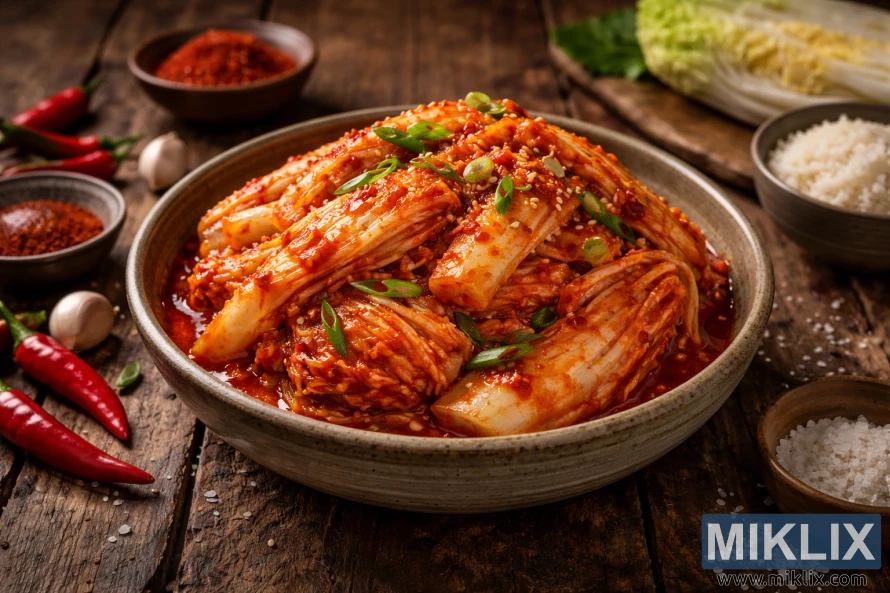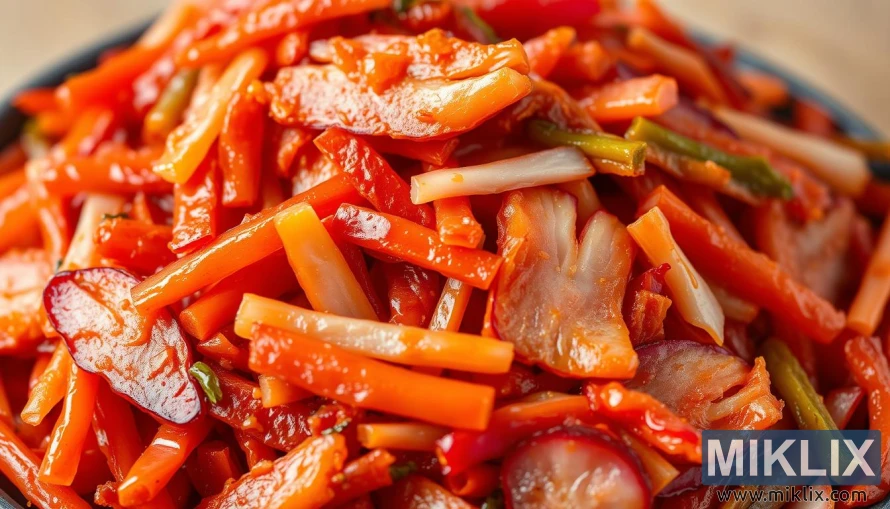Kimchi: Korea’s Superfood with Global Health Benefits
Published: May 15, 2025 at 1:12:42 PM UTC
Last updated: December 25, 2025 at 11:35:50 AM UTC
Kimchi is more than a tasty side dish in Korean cuisine. It's a nutritional powerhouse. It's full of probiotics and is one of the most nutrient-dense foods out there. As fermented foods become more popular worldwide, knowing the benefits of kimchi in your diet is key. This article will explore the health advantages of eating kimchi and how it can improve your overall well-being.

Key Takeaways
- Kimchi is rich in essential nutrients and offers various health benefits.
- It is an excellent source of probiotics, promoting gut health.
- Incorporating kimchi into your diet can support immune function.
- Kimchi may help with weight management strategies.
- This fermented food exhibits anti-inflammatory properties.
- Kimchi can be a versatile ingredient in many recipes.
Introduction to Kimchi
Kimchi has been a key part of Korean tradition for centuries. It's more than just a side dish; it's a cultural symbol. Made from fermented vegetables like napa cabbage and radishes, it's seasoned with spices and other ingredients.
Its bold, tangy taste and spicy kick have won hearts globally. The fermentation process boosts its nutritional value, making it rich in probiotics and vitamins. This has made kimchi popular not just for its taste but also for its health benefits.
Kimchi is used in both traditional Korean dishes and modern recipes. It celebrates the art of preserving food and highlights the unique flavors of fermented vegetables.
What is Kimchi?
Kimchi is a traditional Korean dish made from salted and fermented vegetables. It mainly uses napa cabbage. The key ingredients are garlic, ginger, and chili pepper, giving it a unique taste and health perks.
Kimchi is a big part of Korean cuisine. It's often served as a side dish with many meals. This makes it a favorite in many Korean homes.
There are over 200 types of kimchi, showing the variety in Korean food. Each type has its own taste and texture, depending on local tastes and ingredients. You can find baechu kimchi, kkakdugi, and oi sobagi among the favorites.
This variety makes Korean food rich and interesting. It also shows how kimchi is more than just a food; it's a superfood with many uses.
Nutrient Density of Kimchi
Kimchi is known for its high nutrient density, making it great for a healthy diet. It's low in calories but full of important vitamins. A single serving has only 23 calories but is rich in vitamins A, C, K, and B vitamins like B6 and folate.
The kimchi nutrition profile is impressive, with lots of dietary fiber, iron, and riboflavin. These nutrients help with blood clotting and energy. Eating kimchi regularly boosts your health with these essential nutrients in a tasty way.

Probiotics in Kimchi
The fermentation of kimchi creates beneficial probiotics, like Lactobacillus species. These probiotics are key to a healthy gut. Eating fermented foods like kimchi can greatly improve your digestion.
Kimchi can help with digestive issues. It supports the growth of good gut bacteria. This is important for digestion and absorbing nutrients.
Probiotics in kimchi also boost your immune system. They fight off infections and keep you healthy. Plus, they may reduce inflammation, showing their importance in a balanced diet.
Adding kimchi to your meals is a tasty way to get more probiotics. Its unique flavors and health benefits make it a great choice for anyone looking to improve their gut health.
How Kimchi May Strengthen Your Immune System
Many studies show that certain bacteria in kimchi boost your immune system. Lactobacillus plantarum is one such strain that could help. It has been shown to lower inflammation in animal studies, making your immune system stronger.
Even though we need more human studies, early results look good. Eating kimchi might be a tasty way to keep your immune system healthy.
Korean Cuisine and Kimchi's Popularity
Korean food has become very popular worldwide, thanks to dishes like kimchi. This fermented side dish is key to Korean meals, going well with many main courses. It offers unique tastes and health perks.
Kimchi is more than food; it's a symbol of Korean culture. As health awareness grows, kimchi's benefits have made it a favorite. People now look for authentic Korean dishes, highlighting kimchi's role.
Kimchi's taste and health advantages have made it a global favorite. It's now a key part of cooking in kitchens everywhere, showing Korean cuisine's reach.
Anti-Inflammatory Properties of Kimchi
Kimchi is a key part of Korean food and has amazing anti-inflammatory effects. Studies show that kimchi's compounds can fight inflammation. This might help lower the risk of chronic diseases.
Garlic and ginger in kimchi are known to reduce inflammation. This is great for keeping your health in check and preventing heart disease and arthritis.
- Kimchi may reduce oxidative stress.
- Components in kimchi can help regulate inflammatory markers.
- Regular consumption may support overall wellness and longevity.
Eating kimchi can be a tasty way to get these anti-inflammatory benefits. Its unique taste makes meals better and helps your health in the long run.
Kimchi and Weight Loss
Kimchi is a great choice for those trying to lose weight. It's low in calories, making it perfect for many diets. This way, you can enjoy full meals without eating too much.
Kimchi is also high in fiber. This helps you feel full longer. It's easier to control how much you eat and snack.
Studies show kimchi can help with weight control. Eating it regularly might help you lose weight and body fat. It can also lower your blood sugar levels, helping with weight management.
Adding kimchi to your meals makes them taste better. It also adds important nutrients without extra calories. This makes it a good choice for those looking to eat less but stay healthy.
Supporting Heart Health with Kimchi
Kimchi is great for your heart health. It's a tasty addition to any meal. Eating kimchi regularly can help keep your cholesterol levels in check.
Studies show that kimchi's mix of fermented veggies and spices is good for your heart. It also has anti-inflammatory properties. These help lower blood pressure and support heart health.
Adding kimchi to your meals can make them more flavorful. It also gives you important nutrients for overall health. Here are some key kimchi benefits for your heart:
- Helps lower cholesterol levels
- Reduces blood pressure
- Improves overall lipid profiles
- Contributes to reducing the risk of heart disease

Kimchi as a Natural Digestive Aid
Kimchi is a natural digestive aid, making it great for meals that focus on digestive health. The fermentation process in kimchi grows good probiotics. These probiotics help keep the gut flora balanced, leading to better digestion.
Adding kimchi to your meals can help with regular bowel movements. It has dietary fiber that supports this. It may also help with symptoms of irritable bowel syndrome (IBS). Many people find relief from digestive issues with fermented foods like kimchi.
Potential Anti-Aging Effects of Kimchi
Research shows that kimchi might have anti-aging effects. This makes it great for those wanting to stay young. The many compounds in kimchi help fight oxidative stress, a big part of aging.
Here's why kimchi is good for longevity:
- The fermentation process makes antioxidants easier to use.
- Probiotics in kimchi help the gut, boosting overall health.
- Garlic and ginger in kimchi keep cells healthy.
Early studies suggest kimchi can help cells live longer. This supports the many benefits of kimchi that health fans love. As research grows, we might learn more about kimchi's deep impact on our cells.
How to Make Kimchi at Home
Making kimchi at home is fun and lets you pick your flavors and ingredients. This recipe is easy and makes tasty kimchi. First, get your ingredients ready. You'll need napa cabbage, radishes, garlic, ginger, and chili pepper flakes.
- Salting the Vegetables: Cut the cabbage in halves or quarters. Sprinkle salt on the leaves. Let it sit for a couple of hours to remove excess moisture.
- Preparing the Seasoning: In a bowl, mix garlic, ginger, sugar, and chili flakes. This makes a tasty paste.
- Combining and Mixing: After the cabbage is soft, rinse it. Then, mix it with the seasoning paste. Make sure it's well-coated with flavors.
- Fermentation: Put the mixture in a clean jar or container. Leave some space at the top for gases. Seal it and let it sit at room temperature for a few days.
- Refrigeration: When it's fermented to your liking, move it to the fridge. This slows down fermentation.
Don't be afraid to try new things with your homemade kimchi. Add carrots, green onions, or even seafood for different tastes. Enjoy making kimchi and get the health benefits of this nutritious dish!

Dangers and Considerations When Consuming Kimchi
Kimchi is full of health benefits, but it's also important to know the risks. One big worry is kimchi safety, mainly about how it's made and stored. If kimchi isn't prepared or stored right, it can cause foodborne illnesses. To avoid this, it's key to follow safe food handling steps when making it.
Another thing to think about is kimchi's sodium content. Many recipes use salt, which can make kimchi high in sodium. People with high blood pressure or those watching their salt intake should eat kimchi carefully. Choosing low-sodium kimchi or eating it in small amounts can help meet dietary needs.
- Use fresh ingredients and sanitize all equipment before preparation.
- Store kimchi in airtight containers to reduce exposure to air and contaminants.
- Consume kimchi within a reasonable timeframe and monitor for signs of spoilage.
- Be mindful of portion sizes, specially regarding sodium content.
Knowing about these kimchi aspects can make your cooking experience better and safer. Enjoy this tasty dish responsibly!
Kimchi: A Versatile Ingredient
Kimchi is loved for its versatility. It's a favorite in many dishes because of its unique taste. This makes kimchi appealing to many different tastes.
There are many ways to use kimchi in your cooking. Here are a few ideas:
- Served as a side dish with rice or noodles.
- Stir-fried with vegetables and proteins for a quick and flavorful meal.
- Incorporated into soups and stews for added depth and zest.
- Blended into marinades or dressings to enhance flavor.
Kimchi can be used in countless ways, from traditional to modern recipes. Its adaptability has made it a staple in Korean cuisine and a favorite worldwide.

Conclusion
Kimchi is more than a Korean food; it's a superfood full of nutrients and probiotics. It's packed with health benefits like better digestion, immune support, and heart health. Its mix of ingredients adds flavor and boosts well-being.
Kimchi is easy to add to many dishes, making it simple to enjoy its health perks. As it becomes more popular worldwide, trying out different kimchi recipes can spice up your meals. It's a flavorful and healthy addition to any diet.
So, dive into the world of kimchi and discover its delicious taste and health benefits. It's a vibrant, fermented food that can make your meals more exciting and nutritious.
Further Reading
If you enjoyed this post, you may also like these suggestions:
- Cinnamon’s Secret Powers: Health Benefits That Might Surprise You
- Selenium Superstars: The Surprising Power of Brazil Nuts
- Small Fruit, Big Impact: The Power of Apricots for Your Health
